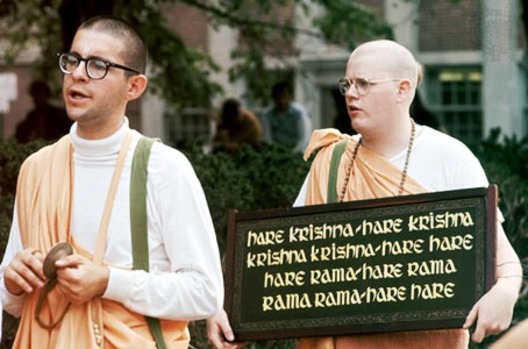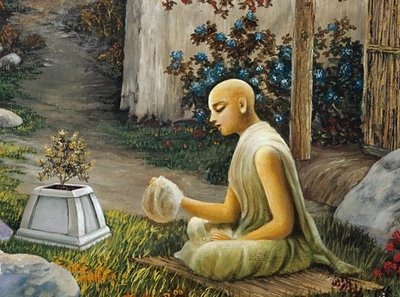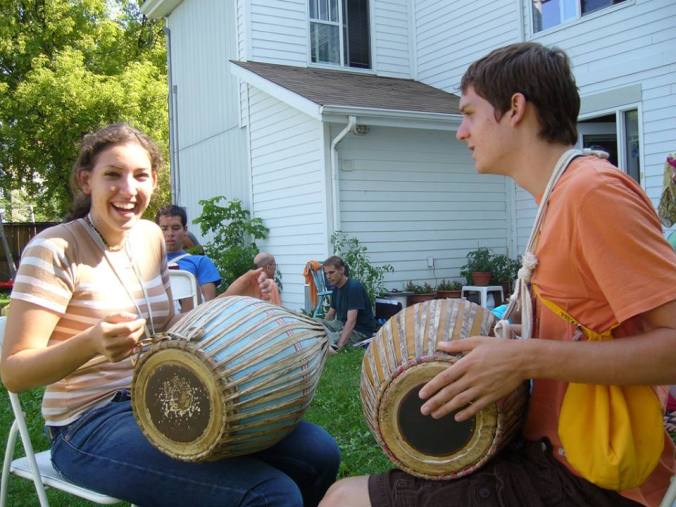By His Divine Grace A. C. Bhaktivedānta Swami Prabhupāda
Sri Chaitanya Charitamrita
Adi Leela Chapter 8 verse 24
‘krishna-nāma’ kare aparādhera vicāra
krishna balile aparādhīra nā haya vikāra
SYNONYMS
krishna-nāma—the holy name of Lord Krishna; kare—takes; aparādhera—of offenses; vicāra—consideration; krishna—Lord Krishna; balile—if one chants; aparādhīra—of the offenders; nā—never; haya—becomes; vikāra—changed.
TRANSLATION
There are offenses to be considered while chanting the Hare Krishna mantra. Therefore simply by chanting Hare Krishna one does not become ecstatic.
PURPORT
It is very beneficial to chant the names śrī-krishna-chaitanya prabhu-nityānanda before chanting the Hare Krishna mahā-mantra because by chanting these two holy names—śrī-krishna-chaitanya prabhu-nityānanda—one immediately becomes ecstatic, and if he then chants the Hare Krishna mahā-mantra he becomes free of offenses.
There are ten offenses to avoid in chanting the Hare Krishna mahā-mantra. The first offense is to blaspheme great personalities who are engaged in distributing the holy name of the Lord. It is said in the śāstra (Cc. Antya 7.11), krishna-śakti vinā nahe tāra pravartana: one cannot distribute the holy names of the Hare Krishna mahā-mantra unless he is empowered by the Supreme Personality of Godhead. Therefore one should not criticize or blaspheme a devotee who is thus engaged.
Śrī Padma Purāna states:
satām nindā nāmnah paramam aparādham vitanute
yatah khyātim yātam katham u sahate tad-vigarhām
To blaspheme the great saintly persons who are engaged in preaching the glories of the Hare Krishna mahā-mantra is the worst offense at the lotus feet of the holy name. One should not criticize a preacher of the glories of the Hare Krishna mahā-mantra. If one does so, he is an offender. The Nāma-prabhu, who is identical with Krishna, will never tolerate such blasphemous activities, even from one who passes as a great devotee.
The second nāmāparādha is described as follows:
śivasya śrī-visnor ya iha guna-nāmādi-sakalam
dhiyā bhinnam paśyet sa khalu hari-nāmāhita-karah
In this material world, the holy name of Vishnu is all-auspicious. Vishnu’s name, form, qualities and pastimes are all transcendental, absolute knowledge. Therefore, if one tries to separate the Absolute Personality of Godhead from His holy name or His transcendental form, qualities and pastimes, thinking them to be material, that is offensive. Similarly, to think that the names of demigods such as Lord Śiva are as good as the name of Lord Visnu—or, in other words, to think that Lord Śiva and the other demigods are other forms of God and are therefore equal to Visnu—is also blasphemous. This is the second offense at the lotus feet of the holy name of theLord.
The third offense at the lotus feet of the holy name, which is called guror avajnā, is to consider the spiritual master to be material and therefore to envy his exalted position. The fourth offense (śruti-śāstra-nindanam) is to blaspheme Vedic literatures such as the four Vedas and the Purānas. The fifth offense (artha-vādah) is to consider the glories of the holy name to be exaggerations. Similarly, the sixth offense (hari-nāmni kalpanam) is to consider the holy name of the Lord to be imaginary.
The seventh offense is described as follows:
nāmno balād yasya hi pāpa-buddhir
na vidyate tasya yamair hi śuddhih
To think that since the Hare Krishna mantra can counteract all sinful reactions one may therefore go on with his sinful activities and at the same time chant the Hare Krishna mantra to neutralize them is the greatest offense at the lotus feet of hari-nāma.
The eighth offense is stated thus:
dharma-vrata-tyāga-hutādi-sarva-
śubha-kriyā-sāmyam api pramādah
It is offensive to consider the chanting of the Hare Krishna mantra to be a religious ritualistic ceremony. Performing religious ceremonies, following vows and practicing renunciation and sacrifice are all materialistic auspicious activities. The chanting of the Hare Krishna mahā-mantra must not be compared to such materialistic religiosity. This is an offense at the lotus feet of the holy name of the Lord.
The ninth offense is described as follows:
aśraddadhāne vimukhe ’py aśrnvati
yaś copadeśah śiva-nāmāparādhah
It is an offense to preach the glories of the holy name among persons who have no intelligence or no faith in the subject matter. Such people should be given the chance to hear the chanting of the Hare Krishna mantra, but in the beginning they should not be instructed about the glories or the spiritual significance of the holy name. By constant hearing of the holy name, their hearts will be purified, and then they will be able to understand the transcendental position of the holy name.
The tenth offense is as follows:
śrute ’pi nāma-māhātmye yah prīti-rahito narah
aham-mamādi-paramo nāmni so ’py aparādha-krt
If one has heard the glories of the transcendental holy name of the Lord but nevertheless continues in a materialistic concept of life, thinking “I am this body and everything belonging to this body is mine [aham mameti SB 5.5.8],” and does not show respect and love for the chanting of the Hare Krishna mahā-mantra, that is an offense.
[Chaitanya Charitamrita Adi Leela 8.24]



Dear All Prabhuji/ Maataji,
Please share all ur experience of Hare Krishna Mahamantra.
Regards,
Manish Junghare
+91- 9892199281
LikeLike
BY CHANTING MAHA MANTRA……………………
HARE KRSNA, HARE KRSNA, KRSNA, KRSNA, HARE HARE
HARE RAMA, HARE RAMA, RAMA, RAMA, HARE HARE
MAKES ME FORGET THE MATERIAL WORLD AND PEOPLE ALTOGETHER.
I FEEL MORE CONNECTED AND CLOSE TO GOD AND FEEL VERY BLISSFUL AND HAPPY INSIDE OUT OF ME! THIS IS REAL FEELINGS OF HAPPINESS!
ONE MUST EXPERIENCE THIS FEELINGS WITHIN AND AROUND HIM/HER BY CHANTING WITH PRACTICING THE MAHA MANTRA DAILY!
PLEASE TRY AND YOU WILL START UNDERSTANDING TALKING GODS’ LANGUAGE SOON!
BEST WISHES ALWAYS!
LikeLike
So True!!
I never knew about this – Have been chanting this mantra quite sometime. It gives first of all
Happiness, Peace & Pleasant Mind!!! Thanks GOD i some how got into those World of Mantra.
Nothing is forever permanent in this material world. Just the Mantra …Stands First!!!..
LikeLike
THANKING TO ALL ……………………………
LikeLike
Pingback: What if Muslims or Christians deny to chant the name of Krishna? | The Hare Krishna Revolution
Is Not Shiva Vishnu an Krishna all one? Why does the teaching show that Shiva or other names of God not equal . Isn’t it that there is only One God with million names?
LikeLike
No all gods are not equal just like in a parliament(India) we can see our Prime Minister is the head just like that Lord Shree Krishna is the Supreme Personality of Godhead all others are his Incarnations they are given different task or different departments you can compare is with the parliament or any other but this is the way it is ☺️
HARE KRISHNA 🙏🏻😌
LikeLike
Srila Srila Srila Prabhupada
LikeLike
Dear Neren,
It happens so because when one realizes the way to address the supreme as Lord Krishna, then addressing him as any other name might not give as much enlightenment or bliss as the pureness the name ‘Krishna’ has.
Thank you.
LikeLike
Sir I wanted to ask that, is mind a part of soul, if it is so, then are the desires of mind the desires of the soul? Actually I wanted to know what actually soul comprises of, does it have emotions, lust, anger and all sort of stuff mind has
https://polldaddy.com/js/rating/rating.js
https://polldaddy.com/js/rating/rating.js
https://polldaddy.com/js/rating/rating.js
https://polldaddy.com/js/rating/rating.js
LikeLike
The mind is not a part of the soul. It is a part of the subtle body. The subtle body comprises of mind, intelligence and false ego. The soul is made up of sat (eternity), cit (knowledge) and ananda (happiness). The mind, which is full of mundane desires, is the enemy of the soul because it becomes the cause of bondage. Whereas, the mind, which is devoid of material desires, becomes the cause of liberation. The soul’s emotions emanate from the mind.
In the conditioned state the mind is made up of matter whereas the soul is always spiritual in nature, and hence the mind, in its conditioned state, is different from the soul. But, in the spiritual world, the mind is spiritual in nature and hence it is non-different from the soul.
I hope this answers your question. If you have any more queries please feel free to contact.
Thanks. Hare Krishna.
Niraj Bidawatka, Editor
The Hare Krishna Revolution
LikeLike
The soul, in order to enjoy, requires the subtle body as well as the gross body. This is applicable not only for the conditioned souls but also for the liberated souls.
Therefore, the devotees reject “sayujya mukti”, or merging into the Brahman effulgence because in this type of liberation, the soul is without the subtle and gross bodies. Hence, without the mind and gross senses, the soul is devoid of any emotions and enjoyment.
Thus the specific answer to your question as to “whether the soul has emotions, lust, anger and all sort of stuff mind has,” is as follows: No, the soul does not have such emotions. But the nature of the soul is anandamaya, i.e. it seeks eternal, cognizant and unlimited bliss. For achieving this state, the soul needs the mind and gross senses. Without them, the soul cannot enjoy.
https://polldaddy.com/js/rating/rating.js
LikeLike
Hare Krishna
I am reading ‘Art of chanting Hare Krishna / Japa Meditation techniques / Mahanidi Swami.’
Re: Ten offences it states…
EXCERPT ONE
‘When one wishes that the holy name will bestow rewards of bhoga or moksha ,considering the name to be equal to pious actions like dharma religiosity, vrata (following vows),or tyaga (renunciation) then he is an offender to the holy name. (namaparadhi)
However on this website: https://www.quora.com/How-do-you-attain-Moksha/answer/Niraj-Bidawatka
EXCERPT TWO
It states…’We can attain moksha by chanting the Hare Krishna mantra. It is mentioned in the Kalisantaran Upanishad that in the present age of Kaliyuga, this Hare Krishna mantra is the only way for attaining liberation. Krishna and His holy names are non-different. The name of Krishna has immense potencies. Therefore by chanting the Hare Krishna mantra, we become pure and go back home, back to Krishna.’
Which statement/proposition is correct please? …can anyone shed any light onto this for me.
Thank You
Kat Naughton
p.s. I am sure the holy name is far greater than anything. I found the following which appears to contradict what EXCERPT ONE is saying but does not raise the issue of attaining moksha.
The eighth offense is stated thus:
dharma-vrata-tyāga-hutādi-sarva-
śubha-kriyā-sāmyam api pramādah
It is offensive to consider the chanting of the Hare Krishna mantra to be a religious ritualistic ceremony. Performing religious ceremonies, following vows and practicing renunciation and sacrifice are all materialistic auspicious activities. The chanting of the Hare Krishna mahā-mantra must not be compared to such materialistic religiosity. This is an offense at the lotus feet of the holy name of the Lord.
Source: https://harekrishnarevolution.wordpress.com/the-ten-offences-to-be-avoided-while-chanting-hare-krishna/
Thank You once again
https://polldaddy.com/js/rating/rating.js
LikeLike
Dear Kat Naughton,
Thanks for initiating such a wonderful discussion. You have made some interesting points. This forum is especially meant for such intelligent spiritual discussions. I am glad that someone is reading so deeply and inquiring such intelligently. All glories to Srila Prabhupada. This is all possible due to the mercy of Prabhupada.
As far as excerpts one and three are concerned, it states that the chanting of the holy names should not be equated with materialistic karma-kanda rituals. Such rituals are performed for attaining mundane benefits.
The inclusion of moksha in the first excerpt is creating confusion to you. There’s no need for getting so much confused. When the karmis are baffled in attaining mundane possessions, they search out for moksha. But, in one sense you are correct – Nobody performs karma-kanda rituals (fruitive activities) for getting moksha. They do it for seeking enjoyment. Hence the third excerpt should be accepted over the first one because the third excerpt is from śastra, whereas the first excerpt is from a book written by a practitioner devotee, who is subject to four defects. Therefore, I would suggest that you read only Prabhupada’s books because they are most authorized as they are written by a self-realized ācārya. An Acharya like Srila Prabhupada is free from four defects, namely bhrama, pramāda, vipralipsā and karaṇāpātava. The self-realized ācāryas do not commit mistakes, they are not illusioned, they don’t have a cheating propensity and their senses are perfect. Therefore when there is any doubt or contradiction, we should always accept what the ācāryas say. The third excerpt is a translation given by Prabhupada from the śāstra. Hence that should be accepted.
As far as chanting Hare Krishna for attaining moksha, as cited in excerpt two, is concerned, that is correct. In the initial stages, the inquisitive soul does not know much about the greatness of bhakti, He is simply aware about the miseries that he is personally experiencing, and simply wants liberation from such miseries. At that stage, such a beginner is advised that chanting Hare Krishna will help him attain liberation (moksha). Then as he makes gradual progress in chanting Hare Krishna and as the holy name gradually cleanses his heart, he becomes aware that the Holy Name should not be used for attaining bhoga (mundane enjoyment) and moksha (liberation). But even after prolonged chanting, if he does not realize the greatness of the Holy Name, and still equates it with mundane ritualistic activities, then he is considered an offender.
The Srimad Bhagavatam (2.3.10) says that:
akāmaḥ sarva-kāmo vā
mokṣa-kāma udāra-dhīḥ
tīvreṇa bhakti-yogena
yajeta puruṣaṁ param
“Whether one is without desire (the condition of the devotees), or is desirous of all fruitive results, or is after liberation, one should with all efforts try to worship the Supreme Personality of Godhead for complete perfection, culminating in Kṛṣṇa consciousness.”
Thus, in the initial stages, even if one desires mundane enjoyment or liberation, one can take up the chanting of the Holy Name but even after prolonged practice of chanting the holy names, if one does not realize that greatness of the Holy Name and equates it with mundane religious rituals, then one commits offence.
I hope this solves your query. If there are any further doubts, please feel free to ask.
Thanks.
Hare Krishna.
Niraj Bidawatka, Editor
The Hare Krishna Revolution
LikeLike